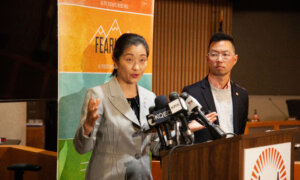The University of Nevada plans to move forward with the Oct. 26 match between its women’s volleyball team and San Jose State University, despite Nevada team members voting to forfeit.
The Nevada Wolf Pack is the fifth women’s volleyball team to forfeit a game against the San Jose Spartans. The California-based team includes player Blaire Fleming, a male who identifies as a female.
While none of the teams cited Fleming as the reason, the Nevada team is the first to point to fairness and safety concerns.
“We demand that our right to safety and fair competition on the court be upheld. We refuse to participate in any match that advances injustice against female athletes,” the team members wrote in a joint statement.
“We, the University of Nevada Reno women’s volleyball team, forfeit against San Jose State University and stand united in solidarity with the volleyball teams of Southern Utah University, Boise State University, the University of Wyoming, and Utah State University,” they wrote.
However, the University of Nevada itself stated that the match will “move forward” as planned, citing Nevada state laws and NCAA regulations. It said the rules require that competitions be held in “an inclusive and supportive environment,” adding that players are free to choose not to participate, and those who skip the game will not face disciplinary action.
On Oct. 22, the University of Nevada and San Jose State released a joint statement announcing that the scheduled match between the two women’s volleyball teams is being moved from Nevada to California.
“The decision to move the location of the match has been made in the best interest of both programs and the well-being of the student-athletes, coaches, athletic staff and spectators. The decision has been made with the approval of the Mountain West Conference,” the schools said.
If the Wolf Pack team players still choose to forfeit the Oct. 26 match, it will take a loss, per the Mountain West rules.
“For me personally, I know it’s very frustrating just because it is my senior season, and I don’t get to play in these games,” Brooke Slusser, co-captain of the San Jose State University women’s volleyball team, told The Epoch Times.
“On the other hand, it’s just another amazing step in the right direction of women standing up, especially it being a team and not the school itself. The women on this team are standing up and saying ‘no’ for all the right reasons,” she said. “You can’t be mad, because they’re doing exactly what needs to happen.”
In a previous statement to The Epoch Times, San Jose State University (SJSU) criticized the cancellations.
“It is disappointing that our SJSU student athletes, who are in full compliance with NCAA and Mountain West rules and regulations, are being denied opportunities to compete,” said Michelle Smith McDonald, SJSU senior director of media relations. “We are committed to supporting our student-athletes through these challenges and in their ability to compete in an inclusive, fair, safe and respectful environment.”
Meanwhile, the NCAA did not directly address cancellations in a statement to The Epoch Times.
“College sports are the premier stage for women’s sports in America and the NCAA members will continue to promote Title IX, make unprecedented investments in women’s sports and ensure fair competition for all student-athletes in all NCAA championships,” it said.
The NCAA is facing a lawsuit over regulations that allow male athletes to compete in women’s sports. The plaintiffs include a coalition of female athletes across various sports.
They argue that the NCAA’s regulations “compromise the fairness and integrity of women’s competitive sports and discriminate against women, violating Title IX’s core principles.”
The lawsuit calls on the NCAA to revoke its policy that allows transgender-identifying males to compete on women’s teams if they “document sport-specific testosterone levels beginning four weeks before their sport’s championship selections” and at other points in the season.
Slusser recently joined the lawsuit against the NCAA.
“If it means I can help make a step in the right direction for improving women’s sports and keeping them women’s sports for the future generations ... I think that was the biggest thing for me,” she said. “Just sitting in the thought of seeing one day my kid having to go through this, I just couldn’t handle that.”














